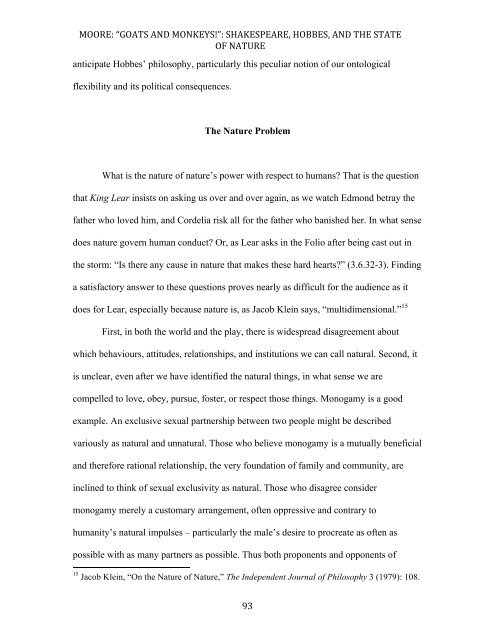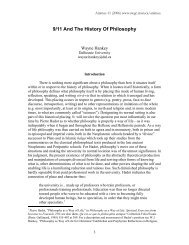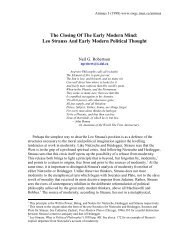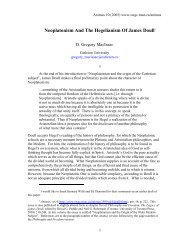âgoats and monkeys!â: shakespeare, hobbes, and the state of nature
âgoats and monkeys!â: shakespeare, hobbes, and the state of nature
âgoats and monkeys!â: shakespeare, hobbes, and the state of nature
Create successful ePaper yourself
Turn your PDF publications into a flip-book with our unique Google optimized e-Paper software.
MOORE: “GOATS AND MONKEYS!”: SHAKESPEARE, HOBBES, AND THE STATE <br />
OF NATURE <br />
anticipate Hobbes’ philosophy, particularly this peculiar notion <strong>of</strong> our ontological<br />
flexibility <strong>and</strong> its political consequences.<br />
The Nature Problem<br />
What is <strong>the</strong> <strong>nature</strong> <strong>of</strong> <strong>nature</strong>’s power with respect to humans That is <strong>the</strong> question<br />
that King Lear insists on asking us over <strong>and</strong> over again, as we watch Edmond betray <strong>the</strong><br />
fa<strong>the</strong>r who loved him, <strong>and</strong> Cordelia risk all for <strong>the</strong> fa<strong>the</strong>r who banished her. In what sense<br />
does <strong>nature</strong> govern human conduct Or, as Lear asks in <strong>the</strong> Folio after being cast out in<br />
<strong>the</strong> storm: “Is <strong>the</strong>re any cause in <strong>nature</strong> that makes <strong>the</strong>se hard hearts” (3.6.32-3). Finding<br />
a satisfactory answer to <strong>the</strong>se questions proves nearly as difficult for <strong>the</strong> audience as it<br />
does for Lear, especially because <strong>nature</strong> is, as Jacob Klein says, “multidimensional.” 15<br />
First, in both <strong>the</strong> world <strong>and</strong> <strong>the</strong> play, <strong>the</strong>re is widespread disagreement about<br />
which behaviours, attitudes, relationships, <strong>and</strong> institutions we can call natural. Second, it<br />
is unclear, even after we have identified <strong>the</strong> natural things, in what sense we are<br />
compelled to love, obey, pursue, foster, or respect those things. Monogamy is a good<br />
example. An exclusive sexual partnership between two people might be described<br />
variously as natural <strong>and</strong> unnatural. Those who believe monogamy is a mutually beneficial<br />
<strong>and</strong> <strong>the</strong>refore rational relationship, <strong>the</strong> very foundation <strong>of</strong> family <strong>and</strong> community, are<br />
inclined to think <strong>of</strong> sexual exclusivity as natural. Those who disagree consider<br />
monogamy merely a customary arrangement, <strong>of</strong>ten oppressive <strong>and</strong> contrary to<br />
humanity’s natural impulses – particularly <strong>the</strong> male’s desire to procreate as <strong>of</strong>ten as<br />
possible with as many partners as possible. Thus both proponents <strong>and</strong> opponents <strong>of</strong><br />
15 Jacob Klein, “On <strong>the</strong> Nature <strong>of</strong> Nature,” The Independent Journal <strong>of</strong> Philosophy 3 (1979): 108.<br />
93
















